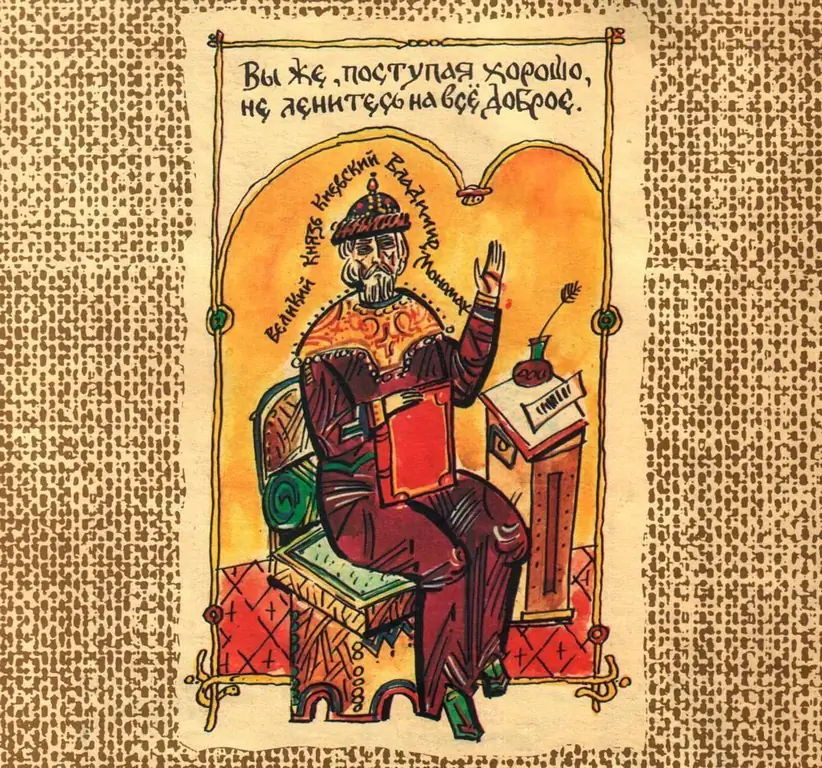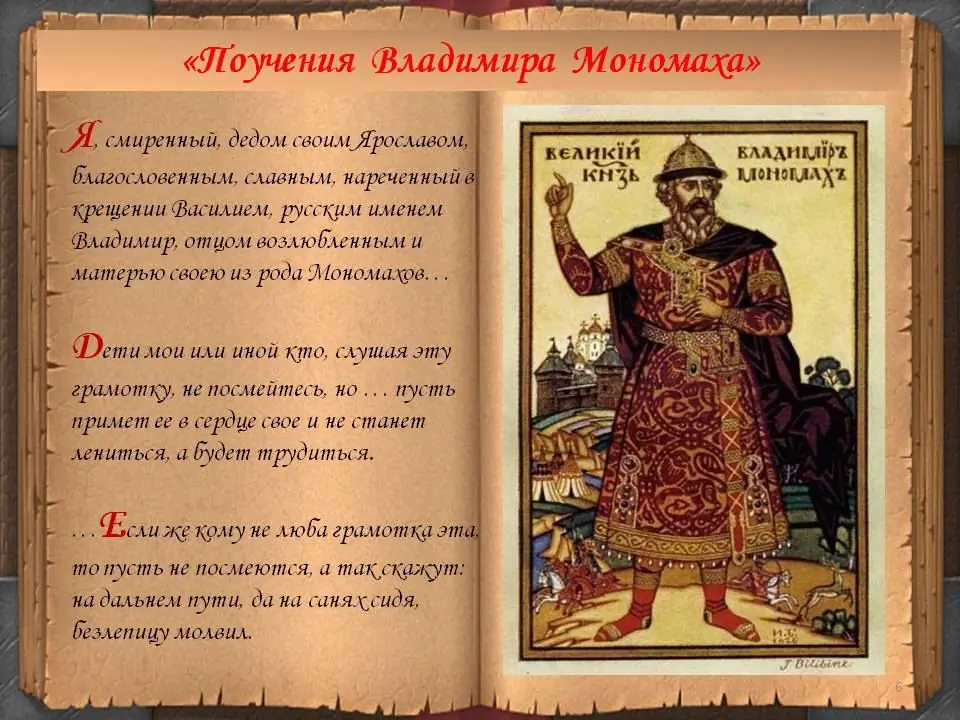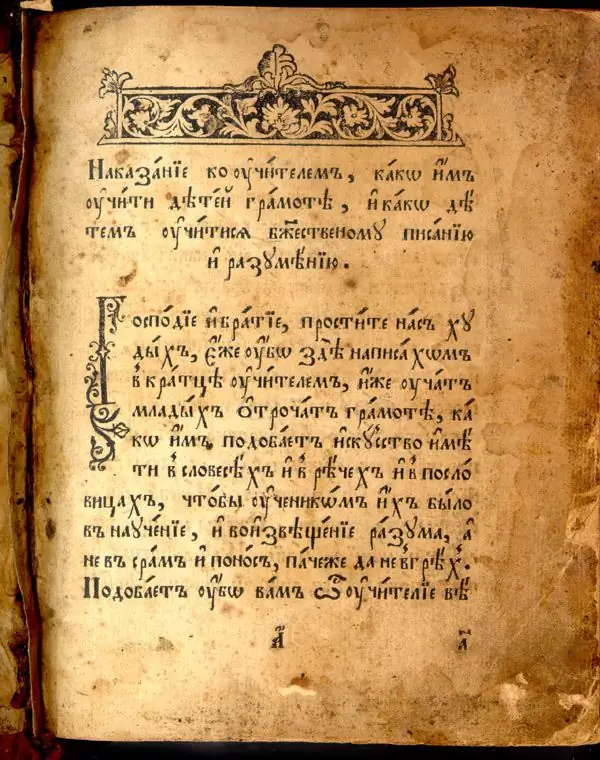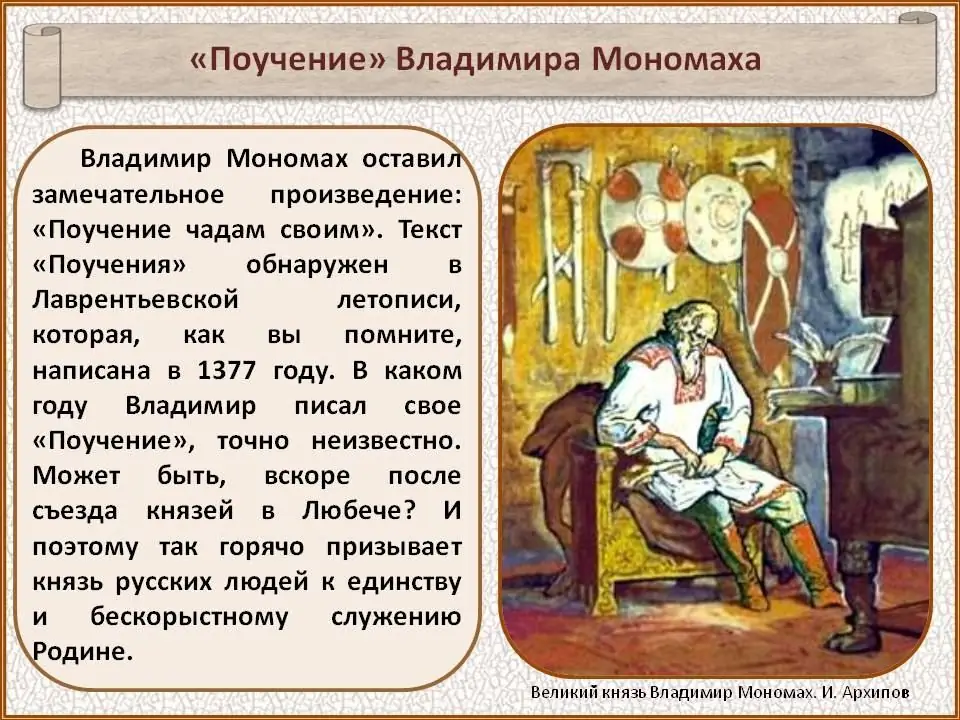- Author Antonio Harrison harrison@cultureoeuvre.com.
- Public 2023-12-16 07:44.
- Last modified 2025-01-22 21:44.
"The Teaching of Vladimir Monomakh" is a literary monument of the twelfth century, written by the Grand Duke of Kiev Vladimir Monomakh. Some sources refer to the work as "The Teachings of Vladimir Vsevolodovich", "The Testament of Vladimir Monomakh to the Children", "The Instructions to the Children". The composition is called the first secular sermon.

The "Instruction" was kept in the collection of manuscripts of Count Musin-Pushin, who collected monuments of Russian antiquity. Only by chance the work did not disappear during the Moscow fire of 1812: it was taken shortly before the disaster by Karamzin. It was with "The Teachings of Vladimir Monomakh" that the tradition of discussing ethical issues in Russian literature began.
History of the composition
The essay contains more detailed information about the events of the 1070-1110s than in the "Tale of Bygone Years". The history of the work is almost a thousand years old. It is imbued with faith in the loftiness of moral norms, raises faith in the good, directs descendants to the path of the world, advising them to forget all disagreements for the sake of a common common goal.
When studying an ancient literary monument in full, it is necessary not only to carefully read the text, but also to pay attention to the historical context. It is against his background that the wisdom of the ruler's advice will stand out more clearly. Vladimir Vsevolodovich headed various regions of Rus before he became the Grand Duke of Kiev in 1113. He was a Monomakh by birth of his mother, who was the daughter of the Byzantine emperor Constantine Monomakh.
The future Grand Duke grew up in a tense atmosphere. He had a chance to go through a whole series of internal feuds, military conflicts with the Polovtsians, which became a serious threat to the ancient Russian state. It is necessary to pay attention to some facts from the personal biography of Vladimir Vsevolodovich when analyzing the work. Vladimir Monomakh differed from many young princes by his amazing peacefulness. So, he renounced the claims to the Kiev throne after the death of his father in favor of his older brother.

The order, of course, was envisaged in the traditions, but in many similar situations conflicts between a relative for power began, which weakened the country.
Main postulates
The main position of Monomakh was faith in God. From this follows his chosen strategy of behavior, approved and supported by Christianity. The prince observed the vows he had given, helped the poor and the weak, honored the elders, and led a righteous life. In his essay, he pointed to the need to lead a righteous life.
Also, the ruler noted the need to carry out prayers. An older motive can also be traced in Monomakh's will. It is noticeable that the veneration of the guest was of particular importance for the ruler. For a long time, there was an unwritten code, according to which the reception of a guest in the house was mandatory, regardless of the time and conditions of life. The only acceptable condition for meeting a stranger was the fabulous "feed, drink and put to bed."
The traveler who looked at the light was an inviolable person. Not even a questioning about who had come from and where did not go down. This could only be told by the traveler himself, at his own request, after its adoption by the owners. The test reflects the totality of ideas of everyday and religious morality. As a wise politician, Monomakh opposed state fragmentation. He became convinced that the lust for power was breaking the stability of the state. In the internecine battles with the use of intrigue and the involvement of external military forces, the author saw only the undermining of the welfare of Russia.
Vladimir Vsevolodovich himself did not increase the influence of his order. From history it is known what resulted in the unwillingness of the descendants to analyze the "Teachings of Vladimir Monomakh" and heed the wise advice given there. The Tatar-Mongol troops that swept across Russia defeated the princes who were distant from each other, establishing their own rule for centuries.

The topic of the values of Christianity was also raised. The author urged to believe in God, to help those in need. At the same time, the ruler did not advocate a complete rejection of wars. As a politician, it is impossible for a ruler to ensure the security of the people and the country as a whole without military force.
Features of the work
A historical source demonstrates that Monomakh took part in many campaigns, concluded dozens of agreements. The prince himself tells about this. It cannot be argued that all the actions of the author are objectively fair. But they always express the interests of his country. So, after accepting a request for help from an impostor claiming the throne of Byzantium, Monomakh understood that there was a deception. The hostilities between Constantinople and Kiev ended in the absence of serious successes, and the agreement was sealed by a dynastic marriage.
Vladimir Vsevolodovich was an educated man. There are many quotes in his work, especially from the Bible. This confirms not only that the ruler has a developed morality, but also his study of the issue before writing his will to children. Many Russian cities are mentioned in the essay. From them they became large centers, for example, Kursk, Novgorod, Vladimir, Rostov. Others have lost their former meaning. Examples are Starodub, Berestye, Kordno. Thanks to the prince's notes on hunting wild boars, deer, and rounds, scientists made conclusions about their habitats. It turns out that with the help of a literary monument, various sciences have received information.
It is impossible to read the ancient text in the original without special preparation. The reason is the too strong difference between the Russian language of the twelfth century and the modern one. It is expressed not only by writing, but also by pronunciation. For example, the letters "small nus" and "big nus" have disappeared, the letter "yat" has been gone for a long time. Modern readers do not know what sounds used to denote hard and soft signs.
Reading the original text is a serious problem. Therefore, translations are used for analysis. Usually adaptations are accompanied by many notes. This greatly simplifies the work with the text. Commentaries are written by professional historians. This allows you not to refer to the encyclopedia and other sources during the study of each question. Despite the huge difference in spelling, there have been no significant changes in the structure of the grammar of the Russian language. This position provides an opportunity to see the stylistic features and literary techniques used by the author.

Analysis
From the very beginning of the "Precept" Monomakh points out the testamentary nature of his edification. According to the ancient Russian custom, the body of the deceased was brought to the burial place by sleigh. Their mention means the approach of death. This gives a special sound to everything that the ruler talks about. Behind his words - a life he lived honestly, giving the right to covenants. For Vladimir Vsevolodovich, all the other princes were children. Therefore, the appeal is addressed to all rulers. The author encourages them to remember their mission, to be faithful servants to the interests of their native land.
The reference to the Bible is clearly traced. Monomakh builds all understanding of the behavior of rulers on its basis. He evaluates everything that has been done and invites others to continue his path. In the "Instruction" the prince appears familiar with book traditions and a man with the gift of speech with a poetic figurative speech. He creates a special language that has become an example of the mastery of artistic speech.
For greater persuasiveness, the author uses examples from his own life, gives a list of trips. This proves that he himself adhered to the rules that he recommends to others. Monomakh calls not to indulge in laziness, to delve into all state affairs ourselves, to avoid senseless bloodshed in order to understand the reasons for what is happening and to behave correctly. This is how the author concludes his essay, showing a desire to leave a mark after himself, to convey life experience to those who receive responsibility for the fate of Russia.
The author mentions the necessity of the responsibility of princes before God, since they received power from above. There is a noticeable connection between the "Precept" and other similar works of medieval literature. But the Russian ruler did not create a literary composition. He tried to convey to the descendants the spiritual and political experience that he inherited at a high price. Vladimir Vsevolodovich warned against repeating their own mistakes of those who received power.
The "Precept" responded to the political needs of the time. It says that what will be their life depends on the unity of the people and the country. The autobiographical work reflects state realities and problems, facts from the personal biography of the great figure.

Understanding the meaning put by the author is achieved by studying not free interpretations, but original documents. Therefore, the study of other texts from different eras also deserves attention.






